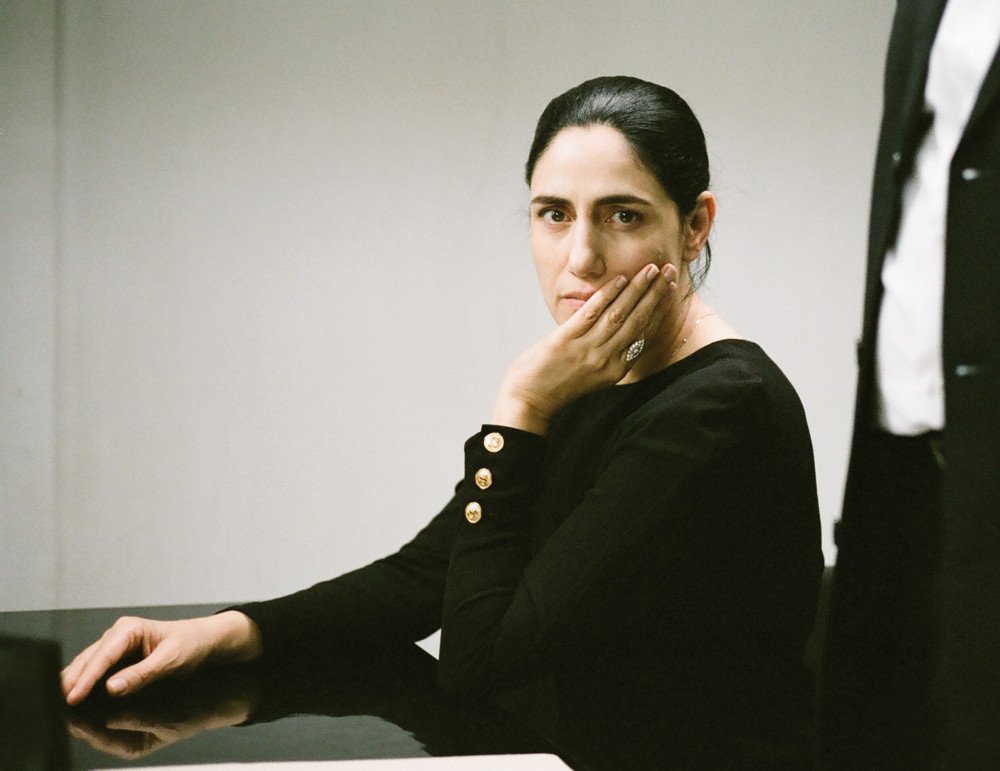
There’s nothing like the commanding music and blood red color that fills the screen during Gett‘s opening credits to immediately establish a sense of urgency that’s impossible to ignore. After all, this is a tale of a woman who spends years trapped in a loveless marriage, and worse, years suffocating in a courtroom where not a single man is willing to listen to her need. It only makes sense to mesmerize an audience from the very start, but Ronit and Shlomi Elkabetz do far more than keep your attention with Gett. They make every single minute of The Trial of Viviane Amsalem as unbearably real and pain-filled as possible, crafting a bold statement about the rabbinical court system and the misogyny inherent in its divorce law.
Even with that sense of urgency washing over you, Gett takes its sweet time letting its courtroom tale unfold. The entire film takes place within the walls of the building in which this small court is located, with most of it taking place within the waiting room or in front of judges. Time passes seamlessly in its coverage of five years worth of divorce proceedings, many months of which are wasted waiting for anyone to make a decision; a true testament to how inefficient and sexist the court system can be to women.
Everyone in the court attempts to bend the will of Viviane Amsalem, who yet again is played by filmmaker Ronit Elkabetz, as she’s done in two other films, both part of the trilogy that climaxes here. It’s entirely unnecessary to watch either To Take a Wife or 7 Days to feel the impact the Gett has to offer, but by the time the film reaches its end, so much has been revealed about the way Viviane and Elisha (Simon Abkarian) feel about each other and their marriage that it’s impossible not to wonder what their lives looked like before now. It’s clear from the court proceedings that Elisha is a manipulative man, one who is more than willing to put off the divorce as long as possible, forcing his wife into compromising positions (especially through his subtle and meaning gestures and silence) and quite literally making her wait one and a half years to actually attend court (and solely by threat of jail time).
With the passing of time and the slow progression of the court case, things are almost always bleak. It’s heartbreaking to watch Viviane remain in this arena of sorts, chained to a monster and full of emotional turmoil. The few moments of humor come in the form of certain witnesses that the court brings in to help analyze the case. Her female family members offer what few moments of relief Gett has to offer, for both the audience and Viviane herself. And yet, as if to directly contrast the way women are shown as reasonable in the film – often forced into a perspective by the men around them – every man who steps through the door comes across like someone desperately trying to hold onto whatever ounce of power they have.
One of the most potent testimonials from a witness is that of one of her neighbors, a woman who is so fearful of her husband that she simply yells at Viviane to do the right thing. The right thing, in this case, is continue living in the pain-filled marriage. “A smart woman should know when to keep her mouth shut,” the neighbor states. “What do they want? Respect. That’s all.” But the men of this film – not a single one of them with the exception of maybe Viviane’s lawyer Carmel Ben Tovim (Menashe Noy) – don’t deserve an ounce of it. It takes three years for the judges to actually allow husband and wife to deliver their own testimonials, with Viviane finally being allowed to bear her soul for the court, but before then, she is constantly held down. It’s hard to decide which man in the room is worst of all: the manipulative husband, the brother who refuses to withdraw support of his brother, or the judges who make this woman run around in circles for over five years and shamelessly tell her to know her place.
As filmmaker and actress alike, Ronit Elkabetz delivers the film and performance of a lifetime. Never does Viviane act as though she has been a perfect wife; she understands and acknowledges her flaws in every moment, including her very own testimony. It’s in her every expression and word (in the few times she is able to speak) that we witness just how much she’s tried to survive in this marriage, and as the years trail on, the toll it takes on her emotionally shows in every close-up that captures her face so perfectly; every single thought and feeling going through her mind on display in subtle facial changes.
Gett: The Trial of Viviane Amsalem only chronicles the experience of one woman desperately trying to get a divorce in a system where she cannot without her husband’s explicit approval, but it’s a journey that many women likely have to suffer through. It’s absurd at times, but it’s all incredibly real and all the more harrowing for that reason. With luck, Ronit and Shlomi Elkabetz’s film will make a true impact on how the lives of all women in these situations are handled.
—
Directed by Ronit Elkabetz & Shlomi Elkabetz; written by Ronit Elkabetz and Shlomi Elkabetz; starring Ronit Elkabetz, Simon Abkarian, Menashe Noy, Sasson Gabai, and Eli Gornstein; 115 minutes.
Gett: The Trial of Viviane Amsalem is undergoing a limited US release, and will be opening in Miami at both the Coral Gables Art Cinema and O Cinema Miami Beach on Friday, February 27th.



 Derek
Derek
 Isabelle
Isabelle